10/31/2005
A Tasteless Food Product
 There are always those companies out there meeting needs that I not only don't have, but I would never have thought that anyone would want the product. The latest such product passes the bounds of decency in that HuFu now offers a tofu specially created to resemble the texture and taste of human flesh.
There are always those companies out there meeting needs that I not only don't have, but I would never have thought that anyone would want the product. The latest such product passes the bounds of decency in that HuFu now offers a tofu specially created to resemble the texture and taste of human flesh. Developed by a business student at Dartmouth based on reading detailed accounts of eating human flesh, the company's president can't honestly say (we hope) that it tastes just like the real thing. The company's website says
If you've never had human flesh before, think of the taste and texture of beef, except a little sweeter in taste and a little softer in texture. Contrary to popular belief, people do not taste like pork or chicken.Dartmouth Review denounced the product citing it as a particular example of
today's culture of multiculturalism and moral relativism, [where] we are increasingly reluctant to make judgments about ideas, practices, or pieces of art. Sure, they say, cannibalism might seem wrong to your hetero-normative, Judeo-Christian culture, but who are we to judge the Aztecs or the indigenous cultures of Papua New Guinea?The Review is right, we can't get around our cultural bias on this one and don't need to do so. If the idea of eating human-flesh-like food bothers you, good. We humans were wired to be repulsed by the idea.
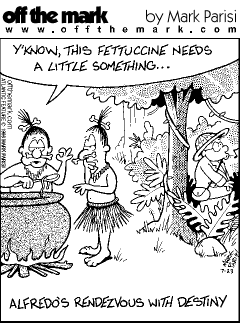 Where does the Bible weigh in on this? Did you know that Cannibalism does occur in scripture (see here). However, the practice is certainly not advocated. The best text to cite for this is Jesus' teaching that fits with a basic teaching throughout all cultures, often called the Golden Rule. Jesus said, "Do unto others as you would have them do unto you." That easily rules out cannibalism.
Where does the Bible weigh in on this? Did you know that Cannibalism does occur in scripture (see here). However, the practice is certainly not advocated. The best text to cite for this is Jesus' teaching that fits with a basic teaching throughout all cultures, often called the Golden Rule. Jesus said, "Do unto others as you would have them do unto you." That easily rules out cannibalism. Find more on the Golden Rule including examples from around the world in the sermon Love, Do Good, Bless and Pray.
As for Hufu, why try it? What good would come from discovering you've got a taste for the stuff?
10/30/2005
Striking the Balance
Knowing God
without knowing our own wretchedness
makes for pride.Knowing our own wretchedness
without knowing God
makes for despair.
Knowing Jesus Christ
strikes the balance
because he shows us
both God
and our own wretchedness.
—BlaisePascal
(1623-1662)
10/29/2005
Holier than thou
In a sermon on this passage, Lisa Mayntz-Ridley says,
However, if we wear a cross we should not expect people to be nice to us because they recognize us as Christians. Instead, we should care for them and serve them.Serving God is its own reward and we are not to try to coaxe others into being impressed with a holier than thou attitude (besides, they would never buy it).We should not overburden one another, or anyone else, in the name of God. Because there is church maintenance to be done does not give us the right to say that there are "Marys" and there are "Marthas" and I will only be one of them. We are called to be both of them.
When we attend meetings we are not more special or know more about God than the one who did not attend. And, when we are in mission, truly in mission, we are not any holier than the one who is at a different point in their journey. We are simply obedient. And loved in a particular way—the way all God's children are loved. And when we are doing the work of God we are growing into our triune God. And, that is somehow miraculously and transformationally part of the reward.
10/28/2005
Believing is Seeing

The photo above is of our own St. Mary's Georgia. It shows highway 40 looking west with the Church of Christ sign visible to the right. It's hard to figure out where the photo was taken because of the prominent mountains towering over the scene. The photo is a creation of our own Bobby Walton who combined photos in Adobe PhotoShop.
So what happens to the old "seeing is believing"? The photo shows that you can't always trust your eyes. It also gives a chance to consider how believing is seeing.
Bobby's trick photo above is not the best example, for there is no deeper, underlying reality. But when see death, but we know the person who has died is with their Lord. Believing is seeing the person we grieve for with their loving creator in eternal life. When we see obstacles that prevent us from living the life to which God has called, believing is seeing that God will remove the obstacles.
Believing is seeing that the visible world is not all there is. The deeper reality is that God is present like a towering rock, if you will, to use the analogy of Bobby's photo. We do not see God's presence in our lives with natural sight, but with the eyes of faith. It's not that we turn our backs on reason, but that we move beyond what we can prove in a labaratory to what God can prove to us in our hearts.
God does not call us to this sort of faith without first giving something on which to reast our trust in him. As Pastor Leonard Vander Zee put it in a sermon on Saint Thomas' famous doubts of Jesus resurection,
Jesus meets Thomas in his doubts, just as he met Mary in her grief, and just as he met Peter in his guilt. Go ahead; touch me, says Jesus. In your blind doubt read the Braille of my wounds.Jesus can take you where you are, and give you the sign you need to answer your present doubts before moving you to the place where believing is seeing. Do you have reasons you can't trust in God's presence? Give the doubts to God and ask for God to give you some sign. It probably won't be a mountain appearing over Saint Marys. Often it is something small to others, but that shows you within yourself the reality of God's presence in your life. Give it a try. As the Psalmist says, "Taste and see that God is good."
In the archives is the sermon Looking with the Eyes of your Heart
Faith is the evidence of things hoped for;
the conviction of things unseen.
—Hebrews 11:1
For we walk by faith, not by sight.
—II Corinthians 5:7
2 Comments:
-
At 10/28/2005 7:32 AM, King of Peace said…
Today's religion column for the Tribune & Georgian, Signs of the End of Time is now online.
-
At 10/28/2005 1:01 PM, King of Peace said…
The November issue of The Olive Branch is now online (and will be going into the mail).
10/27/2005
Spiritual Reading
Wherever you find a little study circle of Christian laity, you can be almost certain that they are studying not St. Luke, or St. Paul, or St. Augustine, or Thomas Aquinas...But I would advise him to read the old....
The only safety is to have a standard of plain, central Christianity ("mere Christianity" as Baxter called it) which puts the controversies of the moment in their proper perspective. Such a standard can be aquired only from old books. It is a good rule, after reading a new book, never to allow yourself another new one till you have read an old one in between. If that is too much for you, you should at least read one old one to every three new ones.
 I don't know that I follow C.S. Lewis' advice to the letter, but I do know that the passage above has been helpful in redirecting me back into the deep traditions of Christianity to read spiritual classics, which have earned their place by speaking to generations of readers. Books such as the slim little Practicing the Presence of God of Brother Lawrence, or the anonymous Russian work The Way of a Pilgrim leap to mind. But there are other spiritual classics such as St. Augustine's Confessions and the anonymous The Cloud of Unknowing and many others. Additionally, there are more recent works that can said to have already have stood the test of time including the writings of Thomas Merton as well as those of C.S. Lewis himself.
I don't know that I follow C.S. Lewis' advice to the letter, but I do know that the passage above has been helpful in redirecting me back into the deep traditions of Christianity to read spiritual classics, which have earned their place by speaking to generations of readers. Books such as the slim little Practicing the Presence of God of Brother Lawrence, or the anonymous Russian work The Way of a Pilgrim leap to mind. But there are other spiritual classics such as St. Augustine's Confessions and the anonymous The Cloud of Unknowing and many others. Additionally, there are more recent works that can said to have already have stood the test of time including the writings of Thomas Merton as well as those of C.S. Lewis himself.  One way to start broadening your selection is to visit the bookshelf near the coffee pot and coke machine at King of Peace where you can check out some books for free, that have already stood the test of time. You may also want to visit online bookstores listed in an earlier post.
One way to start broadening your selection is to visit the bookshelf near the coffee pot and coke machine at King of Peace where you can check out some books for free, that have already stood the test of time. You may also want to visit online bookstores listed in an earlier post. Know that Lewis is right. You will enrich your spiritual journey in seeking out the older books that have already nourished generations of the faithful. The best one close to hand is, of course, the Bible with its 66 books of the Old and New Testaments.
peace,
Frank+
The Rev. Frank Logue, Pastor + King of Peace Episcopal Church
10/26/2005
Some lovableness in all of us

There is a difference between requiring love of the neighbor and finding the lovableness of our neighbors. Søren Kierkegaard wrote of this in his Parable of the Two Artists in his book Works of Love
Note: The artwork accompanying this entry is the work of Hyatt Moore, who painted The Last Supper with Twelve Tribes, a 10-foot wide canvas giclee print of which graces the entry hall at King of Peace. His work exemplifies Kierkegaard's artist who finds beauty in all people.Suppose there were two artists, and one said, "I have travelled much and seen much in the world, but I have sought in vain to find a man worth painting. I have found no face with such perfection of beauty that I could make up my mind to paint it. In every face I have seen one or another little fault. Therefore I seek in vain." Would this indicate the artist was a great artist?
On the other hand, the second one said, "Well, I do not pretend to be a real artist; neither have I travelled foreign lands. But remaining in the little circle of men who are closest to me,I have not found a face so insignificant or so full of faults that I still could not discern a more beautiful side and discover something glorious. Therefore I am happy in the art I practice. It satisfies me without my making any claim to being an artist." Would not this indicate that precisely this one was the artist, who by bringing a certain something with him found then and there what the much-travelled artist did not find anywhere in the world, perhaps because he did not bring a certain something with him! Consequently the second of the two was the artist.
Would it not be sad, too, if what is intended to beautify life could only be a curse upon it, so that art, instead of making life beautiful for us, only fastidiously discovers that not one of us is beautiful. Would it not be sadder still, and still more confusing,if love also should be only a curse because its demand could only make it evident that none of us is worth loving, instead of love's being recognized precisely by its loving enough to be able to find some lovableness in all of us, consequently loving enough to be able to love us all.
2 Comments:
-
At 10/26/2005 12:44 AM, Thumper said…
-
At 10/26/2005 1:32 PM, King of Peace said…
The handout for tonight's class on Revelation is online at http://kingofpeace.org/thesevenbowls.pdf, while all the materials remain online at http://kingofpeace.org/revelation.htm.
10/25/2005
Religious Inheritance
Kathleen Norris asked these questions of fellow writers at a literary gathering and faced their anger for even raising the subject of religion at a writers' conference. She looks at these questions in an essay on Religious Inheritance in her book Amazing Grace: A Vocabulary of Faith. The essay concludes saying:
A young man I know was stunned when he went to Thailand and tried to join a Buddhist monastery. Go back home and become a Christian monk first, they told him, learn your own tradition.At an interreligious conference of Buddhists and Christians monastics held not long ago in a Trappist monastery, a reporter asked the Dalai Lama what he would say to Americans who want to become Buddhists. "Don't bother," he said. "Learn from Buddhism, if that is good for you. But do it as a Christian, a Jew, or whatever you are. And be a good friend to us."
Sit with this a while. What in his comment outrages or repels you? What attracts you? Where do you find yourself resisting what he says? Where do you find yourself assenting? And where does it lead? The Dalai Lama is not Miss America, and does not say what we want to hear. His remarks go to the painful paradox at the heart of religious inheritance: "whatever you are" is what you are born to and raised in. What matters is transformation, the life you make of it. And that is up to you.
10/24/2005
Lazarus Unbound
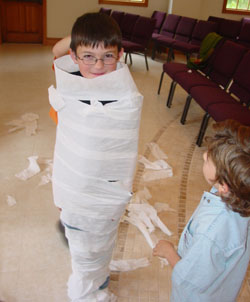 Yesterday was a Kids in the Kingdom Sunday so kids from preschool through fifth grade were invited to stay after church for songs, games, a Bible story, crafts and lunch. We looked at the story of Jesus bringing his friend Lazarus back from the dead and talked about people we know who have died. We considered how, Jesus wanted us to know that death is not the end, we can have eternal life.
Yesterday was a Kids in the Kingdom Sunday so kids from preschool through fifth grade were invited to stay after church for songs, games, a Bible story, crafts and lunch. We looked at the story of Jesus bringing his friend Lazarus back from the dead and talked about people we know who have died. We considered how, Jesus wanted us to know that death is not the end, we can have eternal life. To make this serious lesson fun, we also had a contest with girls and boys on teams seeing who could wrap each person on their team in toilet paper first. Each person was wrapped, and once completely covered they were told "Unbind her (or him) and set her free."
In a sermon on this story I gave this past March, Lazarus Unbound, I said
the thrust of this passage for me comes in the closing words, “Jesus said to them, ‘Unbind him, and let him go.’” This statement is, for me, both immanently practical and clearly metaphorical.
First, the practical. Lazarus was prepared for burial. His ankles would have been tied together and his wrist bound in front of him. He would have also had a strap around his chin. Then rather than being wrapped mummy-style, there would have been a large burial sheet under the length of his body that in once piece went up his back over his head and down the front. This shroud would have been further strapped around in place with wrappings. Lazarus was quite literally bound up in his burial clothes.
Beyond the practical, Lazarus was bound to death. Lazarus needed to get separated from the power of death. Yes, he would die again one day, but Lazarus did not have to live under the bondage of death. For each of us without Jesus is bound to death and we need Jesus to unbind us from the power of sin and death....
Jesus is still declaring that death is not the ultimate answer and the grave is not stronger power than the love of God. Jesus calls to you to come out of the grave. Grab hold of the certainty of eternal life. It’s not some distant prospect. You can be unbound right now.
10/23/2005
Rising in the morning

When you rise in the morning,—from Celtic Praise, edited by Robert van de Weyer
what fills your head?
Are you thinking of
food and drink,
the pleasures ahead?
Are you planning
the work you must do,
the labor ahead?
Are you fearful of
snares and dangers,
the evils ahead?
Are you hopeful of
all you'll achieve,
the successes ahead?
Let all those worldly thoughts
swirl in your mind;
Then let them flush away,
like dirt in a river.
Empty your head;
Let your brain be at peace.
Quietly, calmly, serenely
Offer the day to God.

10/22/2005
The Cliff Notes Gospel
Writing about this passage in Christian Century Martha Greene wrote,"`You shall love the Lord your God with all your heart, and with all your soul, and with all your mind.' This is the greatest and first commandment. And a second is like it: `You shall love your neighbor as yourself.' On these two commandments hang all the law and the prophets."
Jewish scholars had surveyed the Torah, counted carefully and discovered 613 commandments. Applying all 613 at once was virtually impossible, even if they could be remembered. If one were to hang all of these laws on one nail, what nail would it be? Jesus uses two nails: love of God and love of neighbor. The formula is memorable and its simplicity appealing. It could almost be a motto on the company stationery. Yet I wonder if the result for those repeatedly exposed to these basic tenets of Christianity has been not simplicity, but dilution, or even a "dumbing down"...
We know that loving God is not the same as loving our neighbor. Frankly, loving a neighbor may at times be easier than loving God, just by virtue of the concrete visibility of the neighbor. And neighbors might make fewer demands on us. But the converse is also true. Humanistically oriented Christians assert that love of neighbor is worship, thereby concluding that worship is superfluous. I contend, however, that worship is still our primary expression of our love for God. Calvin said in his Institutes, "Surely the first foundation of righteousness is the worship of God. When this is overthrown, all the remaining parts of righteousness, like pieces of a shattered and fallen building, are mangled and scattered."
On the other hand, worship-without-neighbor-love deletes the logical conclusion of loving God. The foundation of neighbor love is to recognize that, as God's own, we are called to love what God passionately loves. The inseparable unity into which Jesus brings love of God and neighbor has its meaning not in the similarity of God and neighbor, but in the nature of love itself. To love God and neighbor is to enlarge the boundaries of the self so that universalizing love is possible.
10/21/2005
Gadgets for God
 The folks at Ship of Fools keep a set of pages compiled on the Christian junk available hither and yon. Called Gadgets for God, the pages reveal our tendency, when faced with honoring the divine, to make trinkets.
The folks at Ship of Fools keep a set of pages compiled on the Christian junk available hither and yon. Called Gadgets for God, the pages reveal our tendency, when faced with honoring the divine, to make trinkets. You'll find Wash Away Your Sins Soap, which will "Make 'cleanliness is next to godliness' a reality: only $8.00 for seven ounces of creamy righteousness from the oldest soap makers in New England."
There is also The Bobble Head Mary "The BVM (Blessed Virgin Mary) meets the BHM (Bobble Head Mary) in one of this year's Most Highly Favoured Kitschmas gifts. Immaculately styled and standing a queenly 8 inches tall, Bobble Head Mary is ready to give her approving nod to all aspects of the Christmas story...Bobble Head Mary can be hailed for just $18.95"
I have to admit coveting the Buddy Christ statue pictured here, which was inspired by the Roman Catholic marketing campaign in the movie Dogma.
There is a lot more there too and it is all real. Certainly if you have been in any Christian Book Store you have seen some junk along with the gems. While our house probably has more than its share of Christian art and other Christian stuff, I wonder what sort of tribute these things—or any things—are to our Lord, who died with no possessions, not even the clothes on his back. Why do we make and buy tchatchkas for Jesus?
Do these things trivialize the Holy or do they in their own way remind us of the one relationship in our lives that matters most?
peace,
Frank+
The Rev. Frank Logue, Pastor + King of Peace Episcopal Church
10/20/2005
The Poison Garden

Apparently King of Peace is not innovative in wanting to get an anti-drug message across in an unusual way (see Going too Far for more on that). The 40-something Duchess of Northumberland took her epic reconstruction of Alnwick Gardens too far as some Brits see it with The Poison Garden. There one finds plants used in creating Heroine (poppies), Cocaine (Coca), growing alongside Marijuna (or cannabis).
An article in The Lady magazine quotes the duchess,
Special government permission was obtained for the cannabis and coca plants, and in addition to 24-hour security, the garden has some plants in cages keeping fingers away from the dangerous leaves, stems and roots.“Children and their parents will be able to go round the garden, which actually has drugs growing in it, and talk about the whole issue,” the Duchess explains. “Apparently, this is a first—and it’s very good to have these discussions in a garden rather than in schools.”
Historically renowned poisons, such as hemlock—used to poison Socrates—and henbane—which Shakespeare had Claudius poured into Hamlet’s father’s ear, are present alongside the modern terror Ricin, essential to create the poison used in terrorist attacks on a Japanese subway.
"The article in The Lady magazine,
No doubt the Duchess wanted to boost publicity and attendance to help cover the £42 Million cost of the garden overhaul, but there is also a strong anti-drug message to The Poison Garden.Visitors are only allowed into the Poison Garden in escorted parties—three parties of a dozen at one time—and two or three people staff it on busy days to make sure that nobody is picking or touching anything, which is very labour-intensive. “I’ve landed myself with another problem, but that’s the story of my life, really. When I hear people’s reactions as they go round, I know it’s worth all the flak to get it right.”
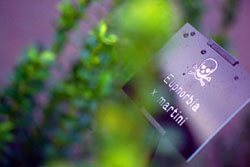 It reminds me of the Police deminstrations in school when I was a kid, when they would show us what Marijuana and Cocaine look like. I was never sure exactly what the point of that sort of demonstration was to be? Why do you have to see the plant or drug to learn to stay away from it?
It reminds me of the Police deminstrations in school when I was a kid, when they would show us what Marijuana and Cocaine look like. I was never sure exactly what the point of that sort of demonstration was to be? Why do you have to see the plant or drug to learn to stay away from it?I know that we are all struggling with how best to keep teens from finding out the suffering and grief that illegal drug use can bring, but what is the right answer? Is the Duchess on to something, or is there a better solution? Parental involvement with their children seems to be the best safeguard, but it is far from sure fire. What is the best way to prevent people from using illegal drugs, or even from abusing legal ones?
peace,
Frank+
The Rev. Frank Logue, Pastor + King of Peace Episcopal Church
PS: The Brunswick News called yesterday and a reporter interviewed me about our most recent youth group meeting. They will be running an article on it. One never knows what will happen between the interview and the article. It all depends on how the quotes are presented, but hopefully they will do a good job with the story.
10/19/2005
Love in forgiveness
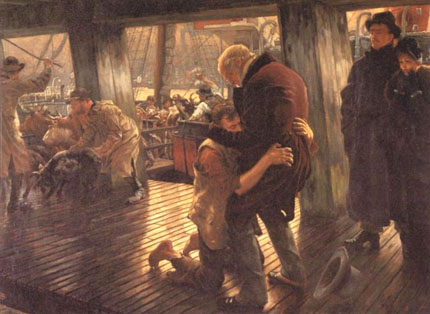
I forgive you for what you believe to be true.
I forgive you for making light of the hurt you have caused.
I forgive you for not saying sorry.
I do not withhold my love.
If I ever do so, please forgive me.
—Modern prayer from Tel Aviv, Israel
Some items in the King of Peace archives are the blog post
and the religion column
Forgive others and unlock your heart
and the sermon
Create in me a clean heart
1 Comments:
-
At 10/19/2005 2:18 PM, King of Peace said…
The handout for tonight's discussion of Revelation 12-14 is online at http://kingofpeace.org/Revelation12-14_salvationhistory.pdf
10/18/2005
Nothing exceeds like excess
We watched a pattern develop. Twenty years ago, seniors went to the beach after the prom and then to someone's house for breakfast. From that, it's turned into a weekend-long orgy that every year has become incrementally more excessive.
 Last year Hoagland felt problems reached what should be their peak when 46 seniors at his school made a $10,000 down payment on a $20,000 rental house in the Hamptons for a post-prom party. The students were forced to cancel the contract, but some parents went ahead and rented a Hamptons house anyway. This year, the school is fighting back declaring the excess of the prom to have gone too far with 11 school administrators signing a letter to parents declaring the prom to be, "an exaggerated rite of passage that verges on decadence." The school has canceled this school year's prom.
Last year Hoagland felt problems reached what should be their peak when 46 seniors at his school made a $10,000 down payment on a $20,000 rental house in the Hamptons for a post-prom party. The students were forced to cancel the contract, but some parents went ahead and rented a Hamptons house anyway. This year, the school is fighting back declaring the excess of the prom to have gone too far with 11 school administrators signing a letter to parents declaring the prom to be, "an exaggerated rite of passage that verges on decadence." The school has canceled this school year's prom.Interestingly, Hoagland has been widely quoted as saying,
It is not primarily the sex/booze/drugs that surround this event, as problematic as they might be; it is rather the flaunting of affluence, assuming exaggerated expenses, a pursuit of vanity for vanity's sake—in a word, financial decadence.Amy Best, an associate professor of sociology and anthropology at George Mason University in Virginia and the author of Prom Night: Youth, Schools and Popular Culture has written, "It is a huge misperception that the kids themselves are totally driving this." She also sees parents who foot the bill as sharing the blame. Find out more about the high school's change of plans in an article at MTV.com or another article at the Guardian Limited.
What do you think? Was the principal on target? Is financial decadence the problem? And what about Bests' comments? How much blame do parents share in prom problems? Is this a local problem for us too, or is this decadence just a Long Island thing?
Raise a child up
in the way he should go
and when he grows old,
he will not depart from it.
—Proverbs 22:6
10/17/2005
A million monkeys
at a million keyboards
could produce the complete works of Shakespeare;
now, thanks to the Internet,
we know that is not true.
—Robert Wilensky, speech at a 1996 conference
 Blogs like this one are the work of tens of thousands of virtually unknown writers toiling away creating untold volumes of writings. Much of what we bloggers write is trivial, and certainly not Twain or Thoreau, much less Shakespeare. Yet blogs do offer an immediacy that has charms of its own. Today I want to offer something brief and then links to other blogs you might enjoy checking in on.
Blogs like this one are the work of tens of thousands of virtually unknown writers toiling away creating untold volumes of writings. Much of what we bloggers write is trivial, and certainly not Twain or Thoreau, much less Shakespeare. Yet blogs do offer an immediacy that has charms of its own. Today I want to offer something brief and then links to other blogs you might enjoy checking in on.One brief thought
There was an item in the New York Times by Heart Surgeon Larry Zarroff about implanting a pig's valve into an Orthodox Jewish man's heart. What does this mean for one who keeps Kosher, to have part of a pig's heart pumping his own heart. The article is Two Ritual Worlds join in the Operating Room. Before finding out what the surgeon and the Orthodox Jew thought, first consider what matters more to you: ritual observance or honoring the gift of the life God gave you?
On to other blogs
Below are the few blogs that I check in on fairly frequently. The list shows my preference for local/Episcopal blogs:
The Geranium Farm is the grandparent of Episcopal Blogs, which started as almost daily emails from the Rev. Barbara Cawthorne Crafton to her congregation and others who wanted to receive them.
Ask the Priest is run by the Rev. David Simmons, who was a year behind me at Virginia Theological Seminary. I have been an occasional contributor to this blog.
Dancing on the Head of a Pin is the blog for St. Michael's Episcopal Church in Waynesboro, Georgia.
St. John's Episcopal Church is a blog from Bainbridge, Georgia.
re-marks is the blog for the Rev. Richard Laribee and St. Marks Episcopal Church in Highland, Maryland.
I also enjoy clicking on the "random" link in the Blogging Episcopalians box that is always on this blog. You can see the more than 150 Episcopal blogs listed here.
If you have any other blogs you visit regularly, please add them in the comments.
 peace,
peace,Frank+
The Rev. Frank Logue, Pastor
King of Peace Episcopal Church
1 Comments:
-
At 10/17/2005 7:11 AM, Cathy said…
10/16/2005
Growth from Pain and Suffering
If a newborn child does not cry out and scream, then it must be slapped until it does. No one has joy in slapping a child—only the longing that it makes full use of its lungs and draws in life-giving air. So in perfect love, God may strike us with blows and stings of pain so that the breath of prayer flows freely through the lungs of our souls. This is the only way we can become strong and fit for eternal life."So then, since Christ suffered physical pain, you must arm yourselves with the same attitude he had, and be ready to suffer, too." I Peter 4:1aLook at the pearl. A pearl is a product of pain and suffering. Tormented by some foreign matter against its soft flesh, the oyster responds by embracing the irritant and transforming it into an object of great beauty. The creation of the pearl not only provides relief to the oyster but is also a source of wonder and pleasure to many others. But beware! The unique luster of the pearl can be easily destroyed. Ink or oils can contaminate and destroy its beauty. Pearls laid in ancient tombs often decay with the corpse of their owners; the dust of the pearls is then mingled with the dust of the dead.
Spiritual life—like the pearl—grows out of pain and suffering. And even when the pain has been transformed into a thing of beauty, the lustre of our spiritual lives can easily become contaminated and decay.
Thousands of years of heat and pressure come to bear on black carbon before it is transformed into a precious diamond. Even then, diamonds do not dazzle unless they have first been cut. When cut and polished, then the rays of the sun make them shine with wonderful colors. Scientists may manufacture artificial diamonds in laboratories, but careful examination exposes their inferiority. Likewise, we cannot attain spiritual perfection without passing through pain and suffering.
1 Comments:
-
At 10/16/2005 4:27 PM, King of Peace said…
Photos from this past Friday's Fall Festival at The Preschool are now online here.
10/15/2005
The image and likeness of God
Lawrence of Brindisi (1559-1619) wrote of this passage:
To each, he says, must be given what belongs to him. This, surely, is a judgment full of heavenly wisdom and instruction. For it teaches that authority is twofold, having an earthly and human aspect, and a heavenly and divine aspect. It teaches that we owe a twofold duty of obedience: to human laws and to the law of God.The coin bearing Caesar's likeness and inscription must be given to Caesar, and the one stamped with the divine image and likeness must be given to God. We bear the imprint of your glorious face, O Lord.
We are made in the image and likeness of God. So you, O Christian, because you are a human being, are God's tribute money—a little coin bearing the image and likeness of the divine emperor. Therefore with Christ I ask, whose likeness and inscription is this? Your answer is, God's. To which I reply, Then why not give God what belongs to him?
If we really want to be God's image, we must be like Christ, for his is the image of God's goodness and the perfect copy of his nature, and God foreordained that those he has chosen should take on a likeness to his son.
10/14/2005
Explaining Goose Music
I heard of a boy once who was brought up an atheist. He changed his mind when he saw that there were a hundred-odd species of warblers, each bedecked like to the rainbow, and each performing yearly sundry thousands of miles of migration about which scientists wrote wisely but did not understand.
No 'fortuitous concourse of elements' working blindly through any millions of years could quite account for why warblers are so beautiful. No mechanistic theory, even bolstered by mutations, has ever quite answered for the colors of the cerulean warbler, or the vespers of the woodthrush, or the swansong, or—goose music. I dare say this boy's convictions would be harder to shake than those of many inductive theologians.
—Aldo Leopold in A Sand County Almanac

10/13/2005
God or Darwin?
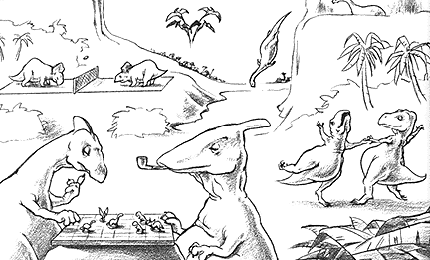
The following was written by the Rt. Rev. Harry Shipps, retired Bishop of the Diocese of Georgia for Spiritus Gladius, the weekly newsletter of St. Paul the Apostle, Savannah:
There is considerable discussion these days concerning creation, evolution, and religion, and what should be taught our children in public schools in the nation.In the King of Peace archives are religion columns for the Tribune & Georgian. One is on the Scopes Trail, Teach your children well and another considering why It doesn't have to be Science vs. Religion.
Much depends on how one understands the Holy Bible of Christians and Jews, and how it relates to scientific inquiry. Creationism is the belief, usually held by evangelical Christians that the Genesis account of the Bible is literally accurate, that God is Creator and that the earth is approximately 4,400 years old.Intelligent design, a recent version of creationsim, holds that creation evolved through a divine designer, God, but that scientific inquiry is apporpriate. This is "faith-based" science. Evolution, first set forth by Charles Darwin in 1859 in "The Origin of the Species," holds that through mutations and natural selection, the human species evolved from lower forms of life. The 1925 Scopes trial in Tenessee found in favor of Creationsism but nonetheless opened the discussion of so-called Darwinism throughout the nation.
Recently the Roman Catholic Archbishop of Vienna wrote: "Necessity and chance" and "Neo-Darwinism" cannot explain creation. "Unguided evolutionary process—one that falls outside the bounds of divine providence—simply cannot exist."
How should science, biology, and philosophy classes handle these subjects in public schools? Can various propositions be presented objectively, with the student deciding as he wills? Eventually our courts will decide, but not easily or quickly.
Creation, in the words of St. Thomas Aquinas, calls for an "unmoved mover," which we call God.The undersigned Christian believes that the scientific explanations of the "Big Bang" fourteen billion years ago, and the emergence of life four billion years ago on this piece of rock we call home, are entirely consonant with Christianity. Science tells us "how." Religion tells us "why." Rather than mutually exclusive propositions, both "how" and "why" are necessary for understanding creation.
+H.W. Shipps
There is also the sermon Thoroughly Postmodern Paul which considers related issues.
10/12/2005
The Eyes of the Beholder
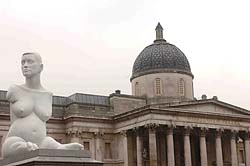 A statue in London's Trafalgar Square has stirred quite a controversy in England. Alongside the grand tributes to England's military might sits the attention-grabbing "Alison Lapper Pregnant," a 13-ton statue of an armless, nude, dwarf, great with child. As Dave Barry is want to say, "I am not making this up."
A statue in London's Trafalgar Square has stirred quite a controversy in England. Alongside the grand tributes to England's military might sits the attention-grabbing "Alison Lapper Pregnant," a 13-ton statue of an armless, nude, dwarf, great with child. As Dave Barry is want to say, "I am not making this up." Trafalgar Square features four plinthes for statues. The other three hold two English generals who fought in India and King George IV who went mad. The fourth plinth remained empty from its construction in the 1800s. The exhibit of Marc Quin's arresting work is part of a plan begun in 1998 to use the fourth plinth in the square for a revolving art show. Instead of placing one statue there for all time, works will be displayed in the prominent location before being removed to make room for a new exhibit.
 The subject of the work is the real life Alison Lapper who was born with no arms and shortened legs due to a chromosomal condition called Phocomelia. Abandoned by her mother, Alison was raised in a care home. Using her feet and mouth, Alison became a successful painter and photographer. Her own naked body has often been her subject.
The subject of the work is the real life Alison Lapper who was born with no arms and shortened legs due to a chromosomal condition called Phocomelia. Abandoned by her mother, Alison was raised in a care home. Using her feet and mouth, Alison became a successful painter and photographer. Her own naked body has often been her subject. In 2000, she beecame pregnant with her son, Parys, who she refers to as "her greatest work." In 2003, she was named to the prestigious Most Excellent Order of the Bristish Empire. Alison was featured with her son in the BBC series Child of Our Time, and she recently published an autobiography, My Life in My Hands. For the sculptor Quin, Alison emobodied a new kind of heroism.
 Some are strongly in favor of the display, while others are just as adamantly against it. Is the statue "a new model of female heroism" or does it serve "the purposes of honoring perverts and deviants." Both views have been claimed. While one might question the artist's decision to show Alison both nude and pregnant, is physical deformity a reason why an already noted member of British society should not be pictured in art?
Some are strongly in favor of the display, while others are just as adamantly against it. Is the statue "a new model of female heroism" or does it serve "the purposes of honoring perverts and deviants." Both views have been claimed. While one might question the artist's decision to show Alison both nude and pregnant, is physical deformity a reason why an already noted member of British society should not be pictured in art? Alison Lapper told London Disability Arts Forum, "As a disabled person, people patronise you and tell you how wonderful and brave you are. But I'm not. I'm just trying to live my life the best way I can."
Do we think our creator's hand slipped while making Alison Lapper? Or does God not love her as much Admiral Nelson who tops a nearby pillar. Artistic judgment aside, what do we think of showing a disabled person in such a prominent location, and what does that say about how we consider the disabled. Scripture would seem to be in favor of Alison Lapper being on the plinth as much as anyone else. The picture we get of Jesus from the Gospels is that he would have reached out to someone like Alison to bring her back into a society that might otherwise shun her. What do you think?
peace,
Frank+
The Rev. Frank Logue, Pastor + King of Peace Episcopal Church
10/11/2005
An Immense Loss
 The enormity of the loss from the the 7.6-magnitude quake in Pakistan is overwhelming with at least 40,000 dead and more than 2.5 million people in need of shelter. A BBC News article stated that
The enormity of the loss from the the 7.6-magnitude quake in Pakistan is overwhelming with at least 40,000 dead and more than 2.5 million people in need of shelter. A BBC News article stated thatMany of the victims were schoolchildren, who had just begun classes when school buildings collapsed on top of them.In prayer for those suffering in this great loss, We remember especially those who have lost their children. These prayers are from Enriching our Worship 2,
Children made up half the population of the affected area and were particularly vulnerable, the UN children's agency Unicef has said.
The BBC's Andrew North in Balakot, where two schools collapsed, says relatives have been frantically digging with bare hands for the several hundred children trapped inside but hopes are fading.
Merciful God, you grant your children an abundant entrance into your kingdom. In your compassion, comfort those who mourn for their children who died in this earthquake and grant us grace to conform our lives to those childrens' innocence and faith, that at length, united with them, we may stand in your presence in the fullness of joy; for the sake of Jesus Christ. Amen.
God of compassion and strength: keep safe the soul of your children who have died in this earthquake now that their moment of pain and fear is passed. Send your healing to their parents, other family and all who mourn, that their suffering may find peace and resolution within your love, whose Spirit gives life in Christ our Savior. Amen.
10/10/2005
Going too far
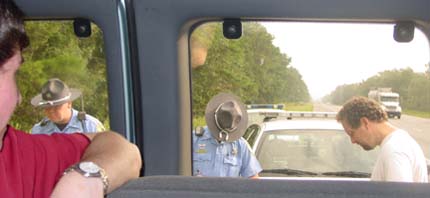
Yesterday, our youth group met at 4 p.m. By 4:10 p.m. we left the church and hit I-95 at exit 6 heading north for a Destination Unknown. These are trips where the youth gather to go to some location to work on a faith-related lesson in place, but they do not know where they are going or what they are doing until they get there.
At mile marker 9, a Camden County Sheriff's Office cruiser pulled in behind us. 2.5 miles later, the car hit its blue lights and I pulled over. I was cited for failure to maintain lane. I had, in fact, maintained the lane, but I did not argue. Instead I provided my license, registration and proof of insurance. They called in my license, then I was asked to step out of the car. I stood with the two officers (a second car had arrived) by the car while they wrote a ticket. They also brought Celeste, the other chaperone in the van back to the police car.
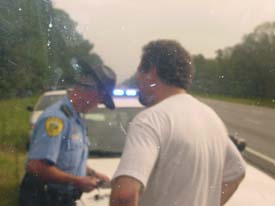 Then they said as a matter of course, they request permission to search vehicles due to the large volume of both illegal drugs and cash that travel I-95. Celeste and I gave permission for the police to search the van. During the search, one of the officers found a small baggie allegedly containing an estimated 1.5 grams of Cocaine. Both Celeste and I were handcuffed, but after discussion, Celeste was permitted to drive the church van to the jail, while I rode in the back of the cruiser. (Imagine what any of this looked like to passers by on I-95 as they saw the driver of a church van handcuffed and placed in a police car.)
Then they said as a matter of course, they request permission to search vehicles due to the large volume of both illegal drugs and cash that travel I-95. Celeste and I gave permission for the police to search the van. During the search, one of the officers found a small baggie allegedly containing an estimated 1.5 grams of Cocaine. Both Celeste and I were handcuffed, but after discussion, Celeste was permitted to drive the church van to the jail, while I rode in the back of the cruiser. (Imagine what any of this looked like to passers by on I-95 as they saw the driver of a church van handcuffed and placed in a police car.)Once at the jail, in the small courtroom within the building used for proceedings like this, I joined the teens and the "arresting officer" let them know that it was all fake. The set up had been to show them how quickly things could change. He warned them of the dangers of using drugs and also of even being in the same vehicle with someone who had illegal drugs in their possession.
But as I looked around at the faces, I realized I had gone too far. The kids were literally in shock from the incident. More than a few tears had been shed and several had to ask to call parents as they had already made cell phone calls from the side of the Interstate saying "Father Frank is being arrested." I apologized to the group, sincerely feeling bad that my stunt had caused them pain. I wanted the meeting to provide an unforgettable lesson, not emotional pain.
Yet, we did continue. A member of our church who had gotten into drug use and sales while at Camden County High School talked with the group about how doing what he thought was cool had wasted the first five years of his adult life. He told them about life in the Camden County Jail, and how quickly your life can change.
We left the jail, bought some snacks at a local store and went out to the River Walk in Woodbine to talk more. I offered that I was picking up feelings that a few of them saw me as "unsafe" while others felt I had betrayed their trust. Several openly admitted that was true. It was painful to see that, for all the right reasons, I had gone too far.
The dangers to these kids I love and others they are in school with are so great. Each of us as parents and concerned adults wants to shelter the students from the pain and suffering drug and alcohol abuse can create. Yet, if in attempting to shelter them from pain, I create emotional distress and a climate of distrust, I may have cut off the limb on which I was sitting.
I'm not writing to get sympathy. I know that the youth will be OK in the long run and that some good will come of the meeting. God has a knack for working all things together for the good. I write instead to struggle out loud with the question of how far is too far when trying to save our children. What I discovered yesterday is that betraying their trust feels too far gone to me. The least they can expect is for their pastor to be safe and trustworthy. I will work to rebuild that trust, knowing that God's grace is sufficient.
peace,
Frank+
The Rev. Frank Logue, Pastor + King of Peace Episcopal Church
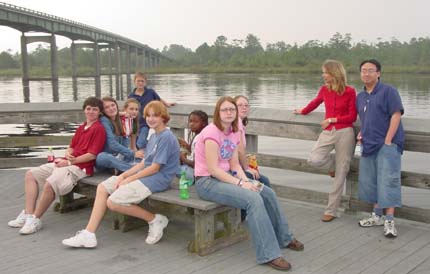
15 Comments:
-
At 10/10/2005 8:07 PM, said…
-
At 10/10/2005 9:26 PM, said…
The kids will definitely never forget that lesson...for the rest of their lives! It's sad that in today's society that we have to go to that extreme to get a point across, but we really have to. Kids today dont understand that even though they arent the user, they can still be prosecuted for being an "accomplice". You are the company you keep. Maybe some older teens and some adults need to be taken on this same trip!
-
At 10/10/2005 10:12 PM, said…
I do not agree with those who think that this was a valuable lesson for the youth. There must be a better way to get your point across without having a sheriff's deputy arrest your priest, and a much loved and trusted priest, at that. Frank, when you wrote that you realized that you had gone too far, I agree with that. We should forgive all those involved, not celebrate this practical joke as a learning lesson. So sorry that this happened, but let us breathe a sign of relief and give each other a sign of peace.
-
At 10/10/2005 10:42 PM, said…
Sometimes one has to take a really tough line with the kids because we care about them so much. Sometimes we have to endure being the "bad guy" because we set such high standards and high expectations.
I don't think that being cool is cool in the long run when you are dealing with people's lives. I believe that we have to be fairly hard core about life lessons.
Sometimes you have to be the mean one, but pray that it will be the best for the kids in the long run. Anyone can be your "friend", but not everyone can teach you life's lessons or responsibility to self and family.
Therefore, I do believe that this lesson was an extremely good one for the kids. I worry about who they trust and how so many of them are"followers". I worry about this unrealistic fantasy world that we adults allow them to believe is truth. Some days, it just ain't pretty out there in the world. I worry about them being manipulated into thinking and doing things that are just not ok and being taken advantage of by so many people. I just hate it for them.
I am glad that Frank has done this. If the kids have a sense of distrust and lack of faith, then we need to teach them about real distrust and real faith in others. They need to learn really fast that all people will let you down and hurt you beyond any comprehension and that the only one that we can truly believe in is Jesus. -
At 10/10/2005 11:04 PM, said…
In response to Kay, It's better that they encountered a situation like this in a "safe environment" rather than later having to experience it in REAL LIFE. Because that IS real life. Kid's today come in contact, especially with drugs EVERYDAY. I've seen drugs being sold at lunch at our local high school, which is considered a "drug-free zone". Kids do not even have to have the wrong friends to be "involved" with drugs.
This "roleplay" could have possibly saved one of their lives. Everything happens for a reason, and I definitely do not think that this experience was a mistake.
Until you've come in to contact with the reality of the situation, you do not know how serious it really is.
To say "I'm sorry this happened" would be extreme. Could it have been learned in a different manner? Possibly. You just never know how God used this situation to help one of those kids. Maybe they've already been faced with it!
Until you've been subject to situations like these, one may not understand how important it really is. I've had friends that have been arrested for just being with someone who had drugs on them in their vehicle. They were not even doing the drugs, they were just riding around with them.
It was a hard lesson to learn. Period. Maybe what these kids experienced will make them think twice in the future as they are trying to make the right decisions. Peer pressure is all around them and this hard lesson may just make that decision an easier one. The "just say no" line--- is just not good enough anymore. -
At 10/11/2005 7:55 AM, said…
-
At 10/11/2005 8:39 AM, said…
In life parents are always going to have to be the "bad guy". When kids get older they will realize (hopefully) that "maybe my parents weren't the 'bad guys'...maybe they did have my best interest at heart. The unfortunate thing is, many times that realization comes far too late when they have made a bad decision. Father Frank stepped into that parental role as a teacher...he taught them that drugs does not have a name, lifestyle, or face. Anyone can, in some way, be affected with this crippling epedimic. My children were affected by this "broken trust" but they realized the lesson behind what Father Frank's message was. If Father Frank has saved ONE child from going down that path of destruction, then he has done his job. I can guarantee that before my kids think of doing something (drugs, alcohol, etc) that image of Father Frank being thrown to the car and handcuffed will make them think twice.
-
At 10/11/2005 10:59 AM, said…
Far too often we see the world in a box, the way WE want to see it, even if that way is not real. If many of the millions of drug offenders in this country had been exposed to what the KOP Youth Group had been exposed to, then perhaps they wouldn't be where they are today. I agree with SMEC, It was gutsy move, but I definitely think the church needed a gutsy move. Who else would go to such great lengths to help our kids make the right choices, and prevent them from ruining their lives?
-
At 10/11/2005 2:34 PM, said…
Wow! That was a great lesson for the youth. Truly, even "good" kids are exposed to more than we can ever know -- believe me, I find their notes at school and they are full of things we'd prefer to NOT think our kids are doing. A great sign of a great teacher: the kids never forget the lesson. Way to go, Frank!
-
At 10/11/2005 6:01 PM, said…
I think that this lesson was right on the money. Kids will give the parents the right answer every time when asked the questions like "would you ever do drugs?" What about the reality of it all? It's like asking a child would you go with a stranger if they were looking for their dog? But, reality atleast 1/2 would. What the world needs more is someone as caring and down to earth as Frank. My thumbs up all the way.
-
At 10/11/2005 8:24 PM, said…
I agree with the person who said that better this be a lesson learned in a safe environment than one that is that person in the real situation. I have gone over this with some of my friends and family who do not live in the area but have teenagers themselves. One common thread is "how lucky we are to have someone who is willing to go to those lengths to teach a most valuable lesson to kids" We can do as many bible studies as we want and to sit in a room and talk about it, but to see it the way it could happen, are 2 completely different things. Our kids need the wisdom and the heart of someone with the willingness as Father Frank and for that I thank you....
-
At 10/11/2005 10:23 PM, said…
I do not believe Frank went into this with "practical joke" as his intent. The intent was to make a point to these kids. How many of us step out every day expecting it to be just like the day before; but events turn out different than we ever expected. This is life. Better to experience it in a control setting than real life. Regarding the trust issue; the kids will soon realize that Frank didn't do this to be sneaky or toy with them. He did it because he loves them. Seeing this happen to their pastor lets them see reality. At any given time, something like this could happen to any of us. I was actually really impressed with the creativity of the whole scenario when Celeste told me about it on Monday. Kids are resiliant and will recover quickly from the shock of this incident- but the lesson will last longer. Also, Kudos to Celeste, who also felt real fear in this, even with the knowledge that it all was fake.
-
At 10/13/2005 4:39 PM, said…
I'm wondering if the parents were consulted before this occurred? I'm not a parent, but have done youth ministry in the past. I couldn't imagine the horror of getting a call from my kid that the priest was getting arrested on the side of the road. The line definitely was crossed. I think the parents of the teens should've been consulted before this extreme event occurred. if they weren't.
Was the Bishop consulted about taking such an extreme measure to get the point across?
I probably would be very skeptical about sending my kid back to the group if I were a parent. Should we go around scaring our kids to death? -
At 10/14/2005 2:34 PM, said…
In response to JSC: yes, as a parent of a youth group participant, when I received a phone call saying that Father Frank had been arrested, my first instinct was shock and as you put it "horror". BUT my next thought and heart's feelings were that Father Frank would NEVER do anything to jeopardize the safety and well being of our children. Maybe by scaring these kids we have saved some kids from getting into situations that they are not prepared to handle. My children will most definitely be going back to the youth group activities--I know it is a place where someone has their best interest at heart.
-
At 10/14/2005 3:26 PM, said…
I appreciate everyone's honesty in this situation and rest assured, I know what goes on in high schools etc. I'm not that far removed from my high school days and I've been in youth ministry for a good 10yrs or so. My comments weren't made as inflammatory just concern. My only point was that I think parents should've been told what was happening before hand. I understand they were given the option of calling Fr. Frank about it or whatever, but it's my position that parents should always know what is being done with their children while at youth group, that's all. Keep in mind that not all kids need to be "scared straight" if you will. It's just like in ministry not all people come to Christ through hell, fire and brimstone kind preaching. I know the premise and the intention was a good one...I just think the means at which you arrived at the point, could've been better that's all. Thanks for allowing me to be honest.
10/09/2005
The Christ-like love of our pets
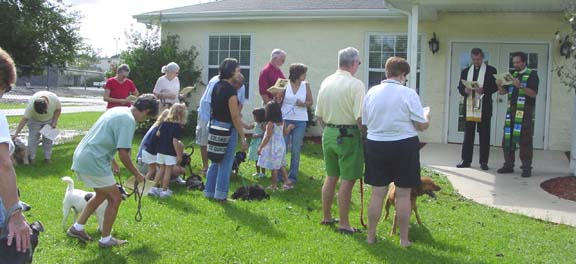
And if thy heart be straight with God,
then every creature shall be to thee a mirror of life
and a book of doctrine,
for there is no creature so little or so vile,
but that shows and represents the goodness of God.
—St. Thomas à Kempis
 Yesterday we held the Blessing of the Animals service at the Camden County Humane Society. It is a time for honoring the pets who are so much a part of our lives as we remember that God loves all creation and not just us humans. And why not, the love our pets show is often so much more Christ like than the love we show one another. Click on either of the photos to see more pictures from the event.
Yesterday we held the Blessing of the Animals service at the Camden County Humane Society. It is a time for honoring the pets who are so much a part of our lives as we remember that God loves all creation and not just us humans. And why not, the love our pets show is often so much more Christ like than the love we show one another. Click on either of the photos to see more pictures from the event.One item in the archives is sad to mention, but such a good resource that it should be referenced here. We have a liturgy for a Pet Funeral that anyone can do on their own. It is so difficult to say good bye to those we love, and it is no different with our pets. This simple service is a meaningful way to make God a part of buring a beloved pet: http://www.kingofpeace.org/resources/petfuneralliturgy.htm
The reason why God’s servants
love his creatures so deeply
is that they realize how deeply Christ loves them.
And this is the very character of love
to love what is loved by those we love.
—St. Catherine of Siena
10/08/2005
Stitching garments of truth
 In tomorrow's Gospel reading Jesus tells the parable of a King giving a large wedding banquet and the guests give excuses and do not bother to show on the evening of the party. The king then sends his servants out again saying, "Go therefore into the main streets, and invite everyone you find to the wedding banquet."
In tomorrow's Gospel reading Jesus tells the parable of a King giving a large wedding banquet and the guests give excuses and do not bother to show on the evening of the party. The king then sends his servants out again saying, "Go therefore into the main streets, and invite everyone you find to the wedding banquet."Once the folks from the street come rushing in, the King corners a guest not properly attired and throws him out. Such a shock after the open invitation to then criticize someone who found themselves unexpectedly a guest of the king. It's another one of Jesus parables that sticks in your craw.
Mr. Craig Canfield, a teacher, poet, and Episcopal layperson active in his parish, St. James, in Eatontown, New Jersey has written
One of the things that bars us from entrance through the door of meaning is our attempt to interpret the meaning of the parables as though the stories are meant to be understood literally. As with our initial scene, such a response flattens out the meaning, makes it comic or banal. Simply put, then, the meaning of today's Gospel story of the marriage feast might be: "You had better get your costume ready if you want to go to the wedding feast or you will be booted out; or, worse, you might be thrown to the dogs!" We leave deeper meaning behind and take off for the mall. The better we look when we go into church for the wedding, the more likely we are of being able to pass into heaven. But for those people with a bit of training in interpreting metaphor (and few could be dull enough to take this parable literally) there would be fewer trips to the mall. There is no section at the mall for symbolic wedding garb, or for symbolic brides. Let's leave the literal and try doing the work of seeing through different lenses, in a way that will
give us a new heart.
If literal interpretations of the parables bring us to a dead end, what will symbolic interpretation open for us. In today's Gospel, Jesus is using the image of a wedding feast, a favorite of his, to speak of his Kingdom of God. There is little mention of the bride in the story. It is not because she is not there. Rather, it is because she is everywhere, for she can be compared to the entire body of Christ's people. Jesus was really talking about a sacred marriage between God and man; between the bridegroom who is the Word and human nature. Jesus himself is the bridegroom and the bride is every one of us. We are being given a picture, Jesus' vision, of the "married land." As in Revelations, the Bridegroom has come. It is heaven where, as we know, there is no marriage in the earthly sense; no human beings split into halves that have to get together. For in heaven all are married. The divine and human in heaven have been united in our minds.
And when he comes, will we be ready? Will we be foolish enough to say that as there is a sale this week we will certainly be able to look our best for the wedding in church? No, the costume in the story is to be understood metaphorically.It is our lives we must change, the contents of our consciousness, our hearts, our vision—not our clothes! These are the intangible garments that concern Jesus...The purpose of a parable is to make one point and the point here is to get ready, to stitch together for ourselves the garments of truth, of the Way, so we will be open to God.
1 Comments:
-
At 10/13/2005 9:00 AM, said…
I believe that this lesson was a good one. All of us as parents hope our children will never get mixed up in any kind of trouble. We never want our children to get hurt in any kind of way especially drugs. I have heard so many parents say things like my son or daughter would never get mixed up in anything like drugs because they were raised in a good christian home and they have been taught right from wrong. Well all I can say is that we never know what our children will get involved in, they are exposed to so much more now than they were in years past. As parents we need to listen to our children more and watch for signs such as not caring about their grades at school,their appearance, spending a lot of time alone and sleeeping a lot. Small things can turn into very large ones. We are not alone, these things happen to rich as well as poor people and educated as well as uneducated people.
10/07/2005
Everlasting Encore

Because children have abounding vitality, because they are in spirit fierce and free, therefore they want things repeated and unchanged, They always say, "Do it again;" and the grown-up person does it again until he is nearly dead. For grown-up people are not strong enough to exult in monotony. But perhaps God is strong enough to exult in monotony.
It is possible that God says every morning, "Do it again" to the sun; and every evening, "Do it again" to the moon, It may not be automatic necessity that makes all daisies alike; it may be that God makes every daisy separately, but has never got tired of making them. It may be that He has the eternal appetite for infancy; for we have sinned and grown old, and our Father is younger than we. The repetition in Nature may not be a mere recurrence; it may be a theatrical encore.
—G.K. Chesterton, Orthodoxy (1908)
Child-Like Faith
Jesus called a small child over to him and put the child among them. Then he said, "I assure you, unless you turn from your sins and become as little children, you will never get into the Kingdom of Heaven. Therefore, anyone who becomes as humble as this little child is the greatest in the Kingdom of Heaven. And anyone who welcomes a little child like this on my behalf is welcoming me. But if anyone causes one of these little ones who trusts in me to lose faith, it would be better for that person to be thrown into the sea with a large millstone tied around the neck.—Matthew 18:2-6
10/06/2005
Fireworks in Vatican Meeting
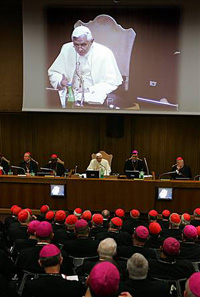 A gathering of 250 Roman Catholic Bishops is usually more reserved, sticking to the approved agenda. Yet news reports coming out of Rome this week were initially more frank. As Daniel Williams of the Washington Post put it in a wire article today
A gathering of 250 Roman Catholic Bishops is usually more reserved, sticking to the approved agenda. Yet news reports coming out of Rome this week were initially more frank. As Daniel Williams of the Washington Post put it in a wire article todayHot topics emerged from the moment the bishops sat down Monday. Among them were a purported shortage of priests, the debate over letting priests marry, and whether communion should be offered to divorced Catholics or to politicians who support abortion rights.But perhaps this should come as no surprise. The bishops had gathered to discuss Holy Communion. And communion should bring up other questions. As we draw closer to God in communion, it should heighten our concern for those with whom we share communion and for those with whom we can't yet share communion.
The Vatican has now clamped down on the more open reporting from the meeting. As CBC News Reported today
The Vatican clamped down on information emerging from a meeting of the world's Roman Catholic bishops Wednesday after some of the prelates had expressed concern that details of their debates had been released.
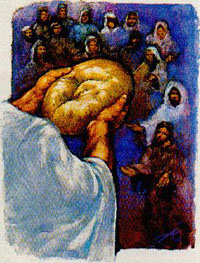 Yet, the 250 bishops are still considering some weighty matters and need our prayer. Why should non-Roman Catholics such as ourselves pray for the bishops? Out of concern for our fellow Christians. If it is God's will for divorced and remarried Catholics to receive communion, then of course we would want our friends and neighbors who this affects to receive the benefit of the sacrament. And if God is moving the Roman Catholic Church toward an end to clerical celibacy, then we would, of course, want that denomination to follow God's will for them. Our own understanding of the communion we share on Sunday and the Communion of the Saints necessitates our prayers for them. The Synod of Bishops will meet for three weeks.
Yet, the 250 bishops are still considering some weighty matters and need our prayer. Why should non-Roman Catholics such as ourselves pray for the bishops? Out of concern for our fellow Christians. If it is God's will for divorced and remarried Catholics to receive communion, then of course we would want our friends and neighbors who this affects to receive the benefit of the sacrament. And if God is moving the Roman Catholic Church toward an end to clerical celibacy, then we would, of course, want that denomination to follow God's will for them. Our own understanding of the communion we share on Sunday and the Communion of the Saints necessitates our prayers for them. The Synod of Bishops will meet for three weeks.
Giving Thanks for God's Word
I thought that no man had been so blind to ask why light should be showed to them that walk in darkness, where they cannot but stumble, and where to stumble is the danger of eternal damnation.—William Tyndale A Pathway into the Holy Scripture, 1531.
 When he penned the lines above, Tyndale (1494-1536) was on the run, a criminal chased across Europe carrying out his illicit project on the sly in borrowed rooms, living under an assumed name. His crime was attempting to place the words of scripture into everyone's hands in a language they could understand. The main charge against him was his ever nearing completion on the first complete translation of the Old and New Testaments into contemporary English. He was tracked like a terrorist for daring to dream that every person might hear God's word in their own language and that all who could read would be allowed to read it for his or herself.
When he penned the lines above, Tyndale (1494-1536) was on the run, a criminal chased across Europe carrying out his illicit project on the sly in borrowed rooms, living under an assumed name. His crime was attempting to place the words of scripture into everyone's hands in a language they could understand. The main charge against him was his ever nearing completion on the first complete translation of the Old and New Testaments into contemporary English. He was tracked like a terrorist for daring to dream that every person might hear God's word in their own language and that all who could read would be allowed to read it for his or herself.Tyndale's work was a race against time with the kings of Europe allied against him. His life reads like a thriller. See the following sample from his life at The Tyndale Society
Realising he could not translate the Bible in England, Tyndale accepted the help of a London merchant and went to Germany in 1524. He never returned to England, but lived a hand-to-mouth existence, dodging the Roman Catholic authorities. In 1525, he and his secretary moved to Cologne, Germany and began printing the New Testament.
But Tyndale was betrayed, and fled up the Rhine to Worms. Here he started printing again, and the first complete printed New Testament in English appeared in February 1526. Copies began to arrive in England about a month later. In October, Tunstall had all the copies he could trace gathered and burned at St Paul's Cross in London. Still they circulated.
Tunstall arranged to buy them before they left the continent, so that they could be burned in bulk. Tyndale used the money this brought him for further translation and revision. At the same time, he wrote polemical treatises and expositions of the Bible.
He began the Old Testament, apparently in Antwerp: Foxe tells how, sailing to Hamburg to print Deuteronomy, he was shipwrecked and lost everything, 'both money, his copies, and time', and started all over again, completing the Pentateuch between Easter and December.
Back in Antwerp, Tyndale printed it in early January, 1530. Copies were in England by the summer. Revisions and shorter translations followed.
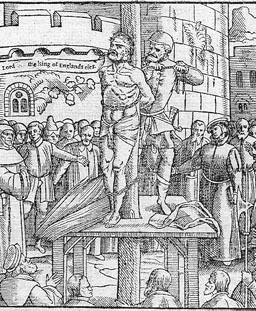 Tyndale was betrayed by a friend, Philips, the agent either of Henry or of English ecclesiastics, or possibly of both. Tyndale was arrested and imprisoned in the castle of Vilvoorden for over 500 days of horrible conditions. Then on the morning of October 6, 1536 William Tyndale was tied to the stake, strangled and burned. His last words were: "Oh Lord, open the King of England's eyes."
Tyndale was betrayed by a friend, Philips, the agent either of Henry or of English ecclesiastics, or possibly of both. Tyndale was arrested and imprisoned in the castle of Vilvoorden for over 500 days of horrible conditions. Then on the morning of October 6, 1536 William Tyndale was tied to the stake, strangled and burned. His last words were: "Oh Lord, open the King of England's eyes."Though his life was given, Tyndale's prayers were answered and Henry VIII printed The Great Bible within three years, which placed the scripture in English in every church of his realm.
Tyndale's influence on the English language was greater than anyone. Tyndale was a pioneer in the use of ordinary language for poetic aphorism. He penned well known phrases in his translation work including
"in him we live and move and have our being,"
"fight the good fight,"
"my brother's keeper,"
"the salt of the earth,"
"filthy lucre,"
"the signs of the times,"
"the powers that be,"
"a law unto themselves,"
and many more phrases through which we have come to know God's Word by way of Tyndale's English. This is because the esteemed committee which created the venerable King James Version kept 85% of Tyndale's work.
Every American household with its average of 2.2 Bibles has William Tyndale to thank. Whether those Bibles are well worn and much loved, or sit gathering dust, Tyndales gave his life willingly so that we might have such open access to God's Word. Thanks be to God for Tyndale's faithfulness unto death.










1 Comments:
At 11/02/2005 1:31 PM, Anonymous said…
Anonymous said…
The mullet makes you look younger, though. It makes you look like Ben Stiller.........I don't know if that's a good thing. Just kidding!
Post a Comment
<< Home